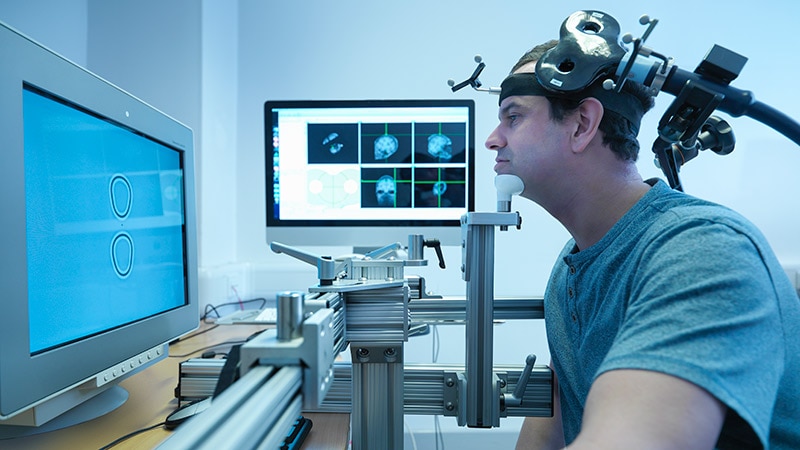Safety of Magnetic Stimulation on Implantable Cardioverter-Defibrillators (ICDs)
Core Concepts
Magnetic stimulation, including transcutaneous and transcranial methods, appears safe with implantable cardioverter-defibrillators (ICDs) based on proof-of-principle experiments.
Abstract
The content discusses the safety of magnetic stimulation on implantable cardioverter-defibrillators (ICDs) based on proof-of-principle experiments.
TOPLINE:
Low risk of damage or heating of ICDs during transcutaneous or transcranial magnetic stimulation.
No experimental data on direct interaction between TMS/TCMS and ICDs previously.
METHODOLOGY:
Experiments using Biotronik ICDs and Medtronic defibrillator leads.
Exposed ICDs to direct magnetic stimulation to investigate interaction, heating, or damage.
Stimulation at increasing output with specific parameters.
TAKEAWAY:
No discernible signal interference up to 50% of maximum output.
Atrial oversensing occurred at 25% of maximum output in dual-chamber mode.
No significant changes in lead impedance, sensing amplitude, or thresholds in MRI mode.
No damage to ICD immersed in saline solution during stimulation.
IN PRACTICE:
Potential therapeutic options for cardiac patients with comorbid depression.
Study led by Felix K. Wegner, MD, University Hospital Muenster, Germany.
SOURCE:
Published online in the Journal of the American College of Cardiology.
LIMITATIONS:
Study focused on specific ICD and defibrillator leads, warranting further research on other devices.
DISCLOSURES:
No relevant conflicts of interest for Wegner.
Magnetic Stimulation Appears Safe With ICDs
Stats
"During these experiments, researchers connected ICDs to a cardiac arrhythmia simulator and exposed them to stimulation at increasing output with a gradient of 9 kT/s at a distance of 2 cm from the coil surface and impulse duration of 280 ms."
"In the first experiment, there was no discernible signal interference up to an output of 50% of maximum, and at maximum output, intermittent ventricular oversensing of the stimulation impulse occurred."
"In the next experiment with the device programmed to a dual-chamber mode and exposed to stimulation with an output of 25% of maximum, atrial oversensing occurred, leading to pacemaker tachycardia that was correctly identified and terminated by the device."
"For the fourth experiment, researchers connected an ICD to a dual-coil defibrillator lead and immersed it in a plastic container with 1.5 L 0.9% NaCl saline solution with the device programmed to a single-chamber mode and exposed to stimulation at an output of 70% of maximum and a repetition rate of 0.9 Hz for 15 minutes; here, the temperature of the saline bath didn't change during stimulation, and there was no sign of damage to the ICD."
Quotes
"In light of the high comorbidity of depression in cardiovascular disease and its distinct effect on outcomes and prognosis, this might add therapeutic options for a significant proportion of cardiac patients."
Key Insights Distilled From
by Pauline Ande... at www.medscape.com 01-18-2024
https://www.medscape.com/viewarticle/magnetic-stimulation-appears-safe-icds-2024a10001f5
Deeper Inquiries
How can the findings of this study impact the treatment options for patients with both cardiovascular disease and depression?
The findings of this study suggest that transcutaneous magnetic stimulation (TCMS) or transcranial magnetic stimulation (TMS) can be safely used with implantable cardioverter-defibrillators (ICDs) without causing damage or interference. This opens up new therapeutic options for patients with both cardiovascular disease and depression. Since depression is highly prevalent in individuals with cardiovascular disease and can significantly impact outcomes and prognosis, the integration of magnetic stimulation in cardiac care could provide additional therapeutic avenues for managing depression in these patients. By offering a safe and effective treatment option like TCMS or TMS, healthcare providers can potentially improve the overall well-being and quality of life for patients dealing with both conditions.
What are the potential risks or limitations of using magnetic stimulation on a broader range of implantable devices beyond ICDs and specific leads?
While the study demonstrated the safety of magnetic stimulation with ICDs, there are potential risks and limitations to consider when applying this technology to a broader range of implantable devices beyond ICDs and specific leads. One major concern is the lack of data on the interaction between magnetic stimulation and other types of devices like pacemakers or different manufacturers' devices. Different devices may have varying sensitivities to magnetic fields, which could lead to unintended consequences such as device malfunction or interference with normal device function. Additionally, the effects of long-term exposure to magnetic stimulation on various implantable devices are not well understood, raising concerns about potential cumulative effects or unknown risks that may emerge over time. Further research is needed to assess the safety and efficacy of magnetic stimulation on a wider range of implantable devices to ensure patient safety and device functionality.
How can the integration of magnetic stimulation in cardiac care lead to advancements in treating other comorbid conditions?
The integration of magnetic stimulation in cardiac care has the potential to drive advancements in treating other comorbid conditions beyond depression in patients with cardiovascular disease. By demonstrating the safety and feasibility of using magnetic stimulation with implantable devices like ICDs, this study paves the way for exploring the therapeutic benefits of magnetic stimulation in managing a variety of comorbid conditions. For example, magnetic stimulation has shown efficacy in psychiatric and neurologic disorders, and its application in cardiac care could extend to treating conditions such as anxiety, cognitive impairment, or chronic pain that often coexist with cardiovascular disease. By expanding the use of magnetic stimulation to address a broader range of comorbid conditions, healthcare providers can offer more comprehensive and personalized care to patients, potentially improving overall health outcomes and quality of life.
0
